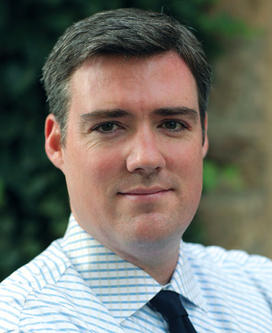A moment with ... Tom Dunne

For Associate Dean of Undergraduate Students Tom Dunne, few student requests are too wacky to be dismissed out of hand. Students want to set up a lingerie-clad, bound and gagged blow-up doll to protest U.S. policy relating to funding for family planning abroad? OK. Animal-rights activists want to wrap themselves in cellophane and pretend they are pieces of meat? No problem. Understanding and patience flow in abundance in Dunne’s office, which advises student organizations and plans nonacademic activities related to orientation and Commencement. Dunne spoke with PAW on the day after Commencement, just a few hours after he and his colleagues had started working on Class Day 2010. He was exhausted, but nevertheless enthusiastic.
What exactly do you do?
We’re fortunate to have students who are very creative, bright, and ambitious, who want to contribute either on campus or in the greater community, and come in with a ton of ideas. I see our role as trying to help them be as productive as they can with their time and resources.
The vast majority of my time is working with students to help crystallize what they hope to accomplish with their program — what they’re trying to communicate, where they see opportunities for collaboration. It’s really getting them to think at a sophisticated level, not only about the logistics of an event, but about what it says about their group’s mission. We definitely want these activities to be student-driven — that’s the whole point of our office.
Additionally, we advise the Undergraduate Student Government and the class governments, and we work yearlong on big campus events. I’m also the person who attempts to censor the band’s halftime shows. There’s always a lot of interesting conversations with the band about where the barometer is for appropriate comments.
Can you describe a typical day in your life?
When classes are in session, the term “typical day” or even the term “day” is a loose construct. It’s common to get e-mails from students at 2 a.m. about their new grand vision, which they want to get up and running in a day or two. Every day, you come in and the students bring all sorts of unexpected new ideas, new challenges, and new opinions in the door. It makes it a very dynamic place to work.
So on any day, I might be working with an association to help students find hotels in D.C. when others come in trying to find the largest pig in the tri-state area, and then a student publication comes in wanting leads on the best printing shop for the price. It runs the gamut. You have to be very flexible.
Sorry ... The largest pig in the tri-state area?
The pig roast is an annual tradition of the Princeton Southern Society. This year, at my encouragement, they bought a pig that was too big for the smoker, and it fell out in the middle of the night. So the students e-mailed me, notifying me that the pig had fallen out, that they were able to put out the fire, and that they were desperate for emergency funding to buy already-prepared pulled-pork barbecue.
I usually stay up pretty late and I have a new baby at home, so I was multitasking at 2 a.m. when the e-mail came in, checking the Blackberry and feeding the baby a bottle. I don’t know what kind of a father that makes me, but ...
What have you learned from students in your time at Princeton?
One thing I love about Princeton and about my job is that there’s a lot of reciprocity between the work that students do in their classes and their own personal passions.
So I’ve learned about things like the Slow Food movement, microfinance, banking via cell phones in developing countries, and online-voting security. These are all things students brought to me before I was even aware of them. Months, or years, later I’ve seen them become mainstream media stories.
As far as trends, in my 10 years here, the focus has become much more international. Students are really interested in doing work in Africa. The interest in community-building and concepts of civic engagement has become more advanced and sophisticated.
I’ve also learned to never, ever underestimate a Princeton undergraduate. There are times when I’ve thought, “I can’t see that making a real splash on campus,” and it’s been incredibly successful.
How do you prepare yourself for whatever will come next?
First, I think you just have to throw yourself in with the enthusiasm that the students have.
In our office, we constantly remind ourselves that these students are volunteers, and they have very demanding lives outside their student-organization work. The same person who’s doing last-minute funding requests for a theater performance is also a molecular-biology major with papers due and a campus job. Secondly, I think about the commitment and promise we’ve made to these students about the type of environment they’re coming to. Princeton is an institution that prides itself on giving undergraduates opportunities to learn and lead. We have to uphold our end of the deal.
— Interview conducted and condensed by Hilary Parker ’01











No responses yet